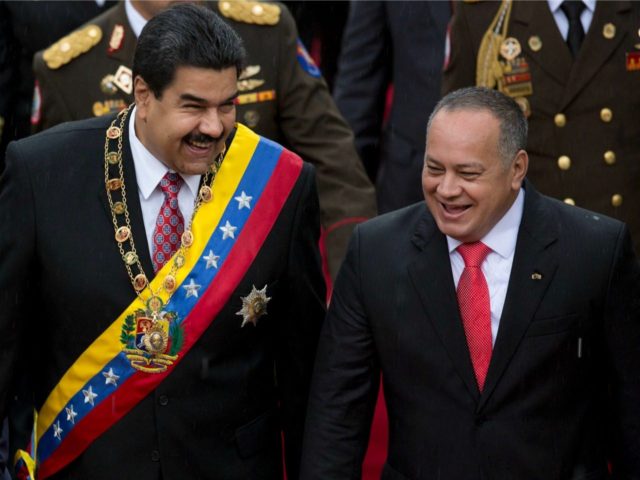Venezuelan National Assembly Minority Leader Diosdado Cabello, the socialist party’s second-in-command and a longtime force within the national left, has filed a lawsuit against the Wall Street Journal for publishing reports revealing Cabello’s role as a major transcontinental drug trafficker.
In January 2015, Wall Street Journal — along with other international outlets like Spain’s ABC newspaper — published declarations by Hugo Chávez’s security chief Leamsy Salazar alleging that he had personal knowledge of Cabello’s activities as the head of the Cartel de los Soles, a cocaine trafficking operation that distributed drugs throughout the Western Hemisphere. The Cartel de los Soles is thus named because it is run by major figures in the Venezuelan military, who wear sun badges on their uniforms. Before the unprecedented victory of an anti-socialist coalition in legislative elections in December, Cabello, a soldier, was first in line to succeed president Nicolás Maduro president of the National Assembly.
Cabello’s lawsuit, filed in New York, alleges that the reports “caused, and continue to cause, enormous damage to Mr. Cabello’s reputation and good name, both personally and in his capacity as a key member of Venezuela’s National Assembly.”
Following the Wall Street Journal‘s report, the newspaper cited twelve different sources in the United States government stating they were aware of American investigations into Cabello’s alleged drug smuggling activities. The newspaper is not, however, the first or last place where such accusations have arisen. Former Assistant Secretary of State for Western Hemisphere Affairs under George W. Bush, Roger Noriega, said in an interview four months later that the American government had evidence that Cabello had funneled drug money into Maduro’s presidential campaign, which many speculated at the time had committed election fraud and illegally stripped opposition candidate Henrique Capriles Radonski of the title of head of state. Noriega added that he did not believe Maduro participated in the drug activities, though he benefitted from them and did nothing to stop them.
In February 2016, a former Colombian drug lord revealed in an interview that he had evidence linking Cabello to major cocaine trafficking. Javier Cardona Ramírez, who has long been retired from the trade, claimed that Cabello is a figure of such power in the drug world comparable to Mexico’s Joaquín “El Chapo” Guzmán and by far “Venezuela’s biggest drug trafficker.” Ramírez accused Cabello of shipping cocaine to al-Qaeda and Islamic State jihadists in Africa.
Notably, Cabello was the first name to come up in the arrest of Francisco Flores de Freitas and Efrain Antonio Campo Flores, President Maduro’s nephews. Both are facing charges of attempting to smuggle 800 kilograms of cocaine into the United States. Upon their arrest, they initially claimed the drugs belonged to Cabello.
Cabello has become the public face of a challenge to an opposition-led drive for a recall election against Maduro. Earlier this week, he called for all public employees who are found to have signed a recall petition against Maduro to be fired. “If in any firm we find, for example, the director of a group [who signed], he has to go, he can’t stay in that charge, because how are they going to be able to play that role and sign against Maduro?” he said during his state television program.
The opposition says it has accumulated over one million signatures in a drive to get Maduro back on a ballot. If those votes are ratified, the opposition must collect the signatures of 20 percent of the voting eligible population of Venezuela, about four million votes, according to Capriles Radonski who is leading the drive.

COMMENTS
Please let us know if you're having issues with commenting.